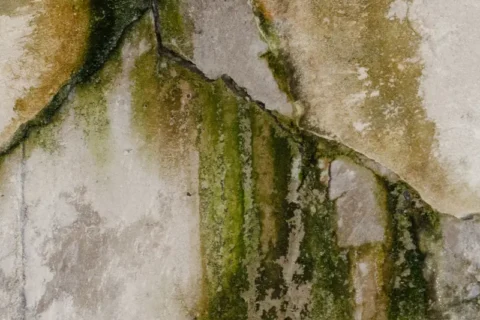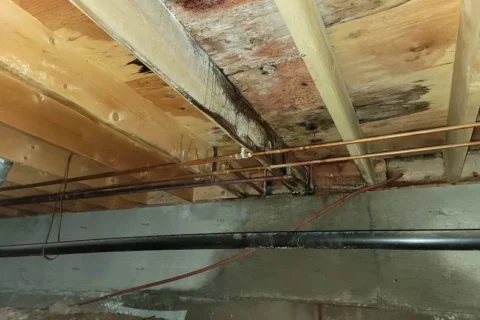Cracks on Cinder Block Foundation Walls
Cracks in Cinder Block Foundations
Finding cracks in your cinder block foundation is concerning. After all, these cracks are more than just cosmetic flaws—they can affect your home’s structural integrity. Whether you notice a tiny hairline crack or a big gash across your basement wall, it’s essential to understand what different types of cracks mean and what to do about them.
Should I Be Concerned About Block Foundation Cracks?
The short answer is yes. Ideally, there should be no cracks in your block foundation, but your level of concern depends on the type of crack you see. Some cracks are relatively harmless, while others signal serious foundation problems. At the very least, cinder block foundation cracks warrant monitoring. A professional evaluation is highly recommended if you see a crack oriented horizontally, widening over time, or combined with water intrusion.
Repairing Cracks in Cinder Block Foundations
Not all cracks require the same approach, and attempting a DIY repair for certain cracks could do more harm than good. Here’s a look at four types of cracks and what it takes to fix each one.
Hairline Cracks in Cinder Block Foundations
These small, thin cracks often appear due to minor settling. If you notice tiny fissures that don’t seem to be growing or letting water in, they might not pose an immediate threat. However, keep an eye on hairline cracks because foundation movement may cause them to widen over time. It’s often possible to seal minor cracks with a patching compound or hydraulic cement to prevent moisture from seeping in and causing further damage.Bottom of Form
Stair-Step Cracks in Cinder Block Foundations
When cracks follow the mortar lines between your cinder blocks in a stair-step pattern, you may have a major foundation problem. This pattern points to uneven settling caused by soil movement or poor drainage. These cracks should be professionally evaluated, as they could worsen if not addressed.
Repairing stair-step cracks usually involves a structural fix. Since these cracks indicate uneven settling, the key is to stabilize the foundation by installing helical piers at strategic points. This transfers the home’s weight onto stable soil or bedrock, preventing further movement.
Horizontal Cracks in Cinder Block Foundation
This type of crack is a red flag. Horizontal cracks, especially wide ones, mean the soil is putting too much pressure on the walls from the outside. Water buildup caused by poor drainage is the most common cause. These cracks can lead to bowing walls and significant structural damage.
Horizontal cracks often require a structural solution. Wall anchors can be installed to stabilize the walls by providing counter-pressure against the soil. Carbon fiber reinforcement is another option, where strips of carbon fiber are bonded to the wall, adding strength and preventing the crack from spreading. In some cases, exterior waterproofing may also be necessary to keep water from pushing against the foundation and worsening the problem.
Vertical Cracks in Cinder Block Foundations
Vertical cracks in cinder block foundations are usually caused by foundation settling or natural shrinkage of the concrete over time. These cracks often appear when a section of the foundation moves downward due to soil compaction or moisture changes. While having small vertical cracks is common and relatively harmless, large or gradually widening cracks could signal more serious settlement issues.
Depending on their width, vertical cracks can sometimes be repaired with epoxy injection. However, always monitor these cracks for changes. If water begins seeping through, or the cracks grow over time, this may indicate more serious settling and warrants a professional evaluation to prevent further structural damage. If the wall is sinking, repairs may include stabilization methods like underpinning or piering. If the wall is leaning or bowing, carbon fiber strips may be recommended.Top of Form
Professional Cinder Block Foundation Crack Repair
Every type of crack besides small hairline fissures could be structural. If you see stair-step, horizontal, or vertical cracks, it’s worth calling a professional, at least for an evaluation and expert opinion. Foundation issues often go deeper than what you can see on the surface. A knowledgeable contractor can assess the true extent of the problem and recommend the best course of action to preserve your home’s structural integrity and restore your peace of mind.
Contact Us for Expert Foundation Crack Repair
Everdry Waterproofing of Wisconsin has over 35 years of experience repairing block foundation cracks. Once we complete a repair, we can install a patented waterproofing system to control moisture and ensure your foundation stays dry and secure. Whether your home is built with cinder blocks, poured concrete, brick, or stone, we can tailor a repair plan to your home’s specific needs. And with a lifetime transferable warranty, you can rest easy knowing your foundation is protected for the long haul. Schedule your professional evaluation and repair estimate in the Greater Milwaukee area today.
Ready to Get Started?
Contact Us Today to Schedule a No Pressure, No Obligation, Free Quote!


